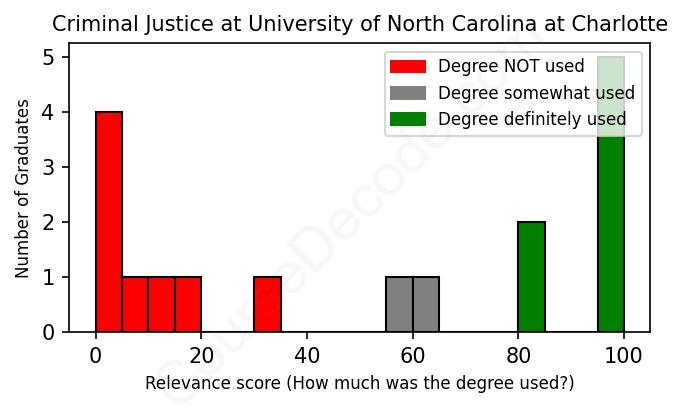
First, some facts. Of the Criminal Justice graduates from University of North Carolina at Charlotte we've analyzed , here's how many have used (or NOT used) their degree in their career:

These are estimates based on AI analysis of 17 LinkedIn profiles (see below).
The verdict? Significantly below average. Overall, with an average relevance score of 50%, Criminal Justice graduates from University of North Carolina at Charlotte have a much lower likelihood (-17%) of finding work in this field compared to the average graduate across all fields:
And for comparison, here's the chart for all profiles we've looked at across all degrees.
Also, after graduating, only 23% of these graduates have pursued further education other than another Bachelor's degree (such as a Masters degree or other), compared to the average across all profiles of 35%. This suggests a Bachelors degree is enough for most Criminal Justice graduates, and it's normal to look for work straight after graduation.
See the details:
|
Relevance score: 0% We think this person has NOT gone into a career related to their degree. We think this person has NOT gone into a career related to their degree.
DEGREE INFOGraduated in 2012 from University of North Carolina at Charlotte with a Bachelor's Degree in Criminal Justice. Also pursued further education since (see below). JOB HISTORY SINCE GRADUATIONVerification Specialist Resident Research, LLC Feb 2013 - Feb 2014 Customer Relationship Specialist  The Hartford Feb 2014 - Dec 2014 Total Loss Claims Adjuster  Travelers Dec 2014 - May 2016 Claims Generalist  Progressive Insurance Oct 2016 - Jan 2018 Unrepresented Bodily Injury Adjuster  Progressive Insurance Jan 2018 - Dec 2019 Attorney Represented Bodily Injury Adjuster  Progressive Insurance Dec 2019 - Feb 2021 Litigation Adjuster  Progressive Insurance Feb 2021 - Sep 2021 Claims Supervisor  Progressive Insurance Sep 2021 - Present Commercial lines Attorney repd injury Aduster  Progressive Insurance Sep 2023 - Present FURTHER DEGREES DONE SINCE GRADUATINGMaster of Business Administration (MBA)Ashford University 2015 - 2016 ABOUTMaking a difference one change at a time... |
The top 10 most common jobs done by the graduates we've analyzed (ranked most common to least) are:
When looking at the job outcomes for graduates with a Criminal Justice degree from the University of North Carolina at Charlotte, it’s clear that there's a diverse mix of roles. Some graduates moved into positions that are directly tied to the criminal justice field, such as police officers, paralegals, and investigators, where their education closely aligns with the job responsibilities. However, a significant number of graduates ended up in roles like store managers, sales consultants, and various administrative positions that don't necessarily require any specialized knowledge from their degree. It's interesting to note that while some of these roles might benefit from certain skills like conflict resolution or ethical decision-making, they don't usually engage with the core areas of criminal law or justice systems.
Overall, it seems that many jobs taken by these graduates are not directly relevant to their Criminal Justice training. While a few have successfully leveraged their degree into impactful careers within law enforcement, the majority have found themselves in business, sales, or administrative settings where their criminal justice knowledge isn't a major part of their day-to-day work. So, while a degree in Criminal Justice offers great insights into the legal system, it's clear that not every graduate channels that knowledge into a job that truly reflects what they studied. It’s a bit of a mixed bag when it comes to truly applying their education in the workplace!
Here is a visual representation of the most common words in job titles for Criminal Justice graduates (this is across all Criminal Justice graduates we've analyzed, not just those who went to University of North Carolina at Charlotte):

When you look at graduates from the Criminal Justice program at the University of North Carolina at Charlotte, you'll see a pretty wide mix of career paths. For many, their first jobs right after graduation seem to be somewhat unrelated to what you might expect from a degree in Criminal Justice. A good number of them start in roles that lean more towards customer service, sales, or administrative support, often at companies that don't directly tie into the criminal justice field. For instance, you'll find former students working as team leaders at retail stores or in various positions in corporate settings, like risk analysts at banks. This indicates that while they have knowledge in criminal justice, they might initially struggle to find roles specifically in that field or choose to explore other opportunities after graduation.
However, as time goes on—about five to ten years post-graduation—you'll notice a shift. Many alumni eventually start to gravitate towards positions that are more aligned with criminal justice, especially if they worked their way up in related industries. For example, some transition into roles as paralegals, investigators, or even police officers. There are also those who grow into managerial positions within legal or compliance departments, reflecting a blend of their initial experiences and their educational background. So, while the early career choices may seem scattered or not directly applicable, many graduates do eventually find their way back to their roots in criminal justice, establishing solid careers that align with their degree. It’s a journey that might require some patience and flexibility, but many seem to find success in fields relevant to what they studied.
Honestly, a Bachelor’s degree in Criminal Justice can be a bit of a mixed bag, and the experience at the University of North Carolina at Charlotte isn't much different. Generally speaking, it’s considered to be a manageable degree—definitely not as intense as something like engineering or pre-med, but you still have to put in a fair amount of effort. You'll be covering a variety of topics, from criminal law to ethics and sociology, so some courses might challenge you while others feel more straightforward. If you stay organized, engage with the material, and don’t procrastinate too much, you should be able to handle it without too much stress. Just like any degree, it really depends on your interests and how you approach your studies!
Most commonly, in the LinkedIn profiles we've looked at, it takes people 4 years to finish a Bachelor degree in Criminal Justice.
Looking at the job trajectories of these Criminal Justice graduates from UNC Charlotte, it seems like a mixed bag when it comes to making decent money. Some of them have climbed the corporate ladder fairly quickly, especially those in roles related to risk analysis or management at major companies like PNC and Bank of America. These positions usually come with above-average salaries, especially at the VP level and above. Others, however, have stuck to more entry-level positions or customer service roles for a while, which generally don’t pay as well. For instance, the paths of graduates working heavily in administrative or service roles seem to indicate they might not be raking in the big bucks just yet. Overall, while some are definitely on the path to financial stability, others may not be doing as well—it's pretty clear that your job field and position really influence how much you can make after graduation.
Here is a visual representation of the most common words seen in the "about" section of LinkedIn profiles who have a Bachelor degree in Criminal Justice (this is across all Criminal Justice graduates we've analyzed, not just those who went to University of North Carolina at Charlotte). This may or may not be useful:

Here are all colleges offering a Bachelor degree in Criminal Justice (ordered by the average relevance score of their Criminal Justice graduates, best to worst) where we have analyzed at least 10 of their graduates: